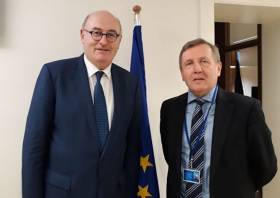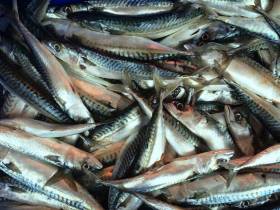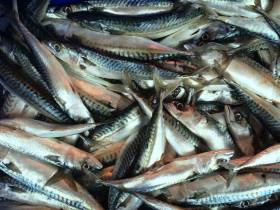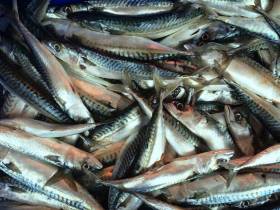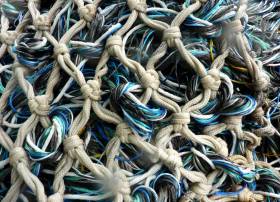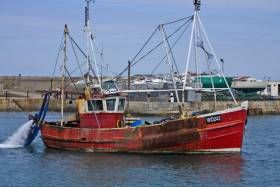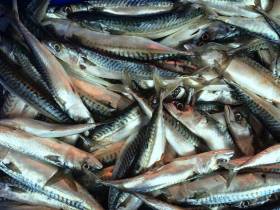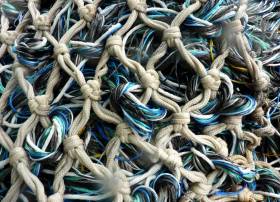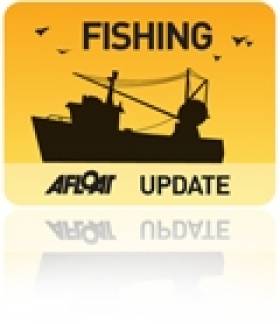Displaying items by tag: quotas
Marine Minister Calls For Swift Action To Support Fishermen In Event Of Hard Brexit
Speaking at the Agrifish Council in Luxembourg yesterday (Monday 14 October), Marine Minister Michael Creed welcomed the solidarity shown by EU member states and institutions regarding Brexit.
Highlighting the need for a swift response to help fishermen and farmers in the event of a hard Brexit, Minister Creed said: “I call on the Commission to be ready to deploy an exceptional aid regulation immediately in the event of a hard Brexit.”
During the Agrifish Council, which continues today (Tuesday 15 October), Minister Creed had constructive discussions with Commissioners Phil Hogan and Karmenu Vella regarding support measures in the event of a hard Brexit and the protection of Irish farming and fishery interests in EU trade negotiations.
With regard to fisheries, Minister Creed took the opportunity to discuss with fellow fisheries ministers the ongoing Brexit preparatory work by the eight EU member states most likely to be impacted.
Minister Creed said: “There has been a significant amount of preparatory work done at official and industry level across the member states and in co-operation with the Commission for all scenarios. The unity of purpose from our EU partners on fisheries, like all other issues, has been heartening.”
Separately, Ireland is also raising at this council the recent decision by Iceland and others to increase their unilateral quotas for mackerel, which threatens the long-term sustainability of Ireland’s single most important fishery.
The minister said: “The recent unilateral actions by Iceland, and later Russia and Greenland, are extremely regrettable and I will continue to work closely with the Commission on possible measures that can be taken in this regard.”
Irish Fishermen's Mackerel Quota Cut By One Fifth For 2019
#Fishing - The European Union, Norway and the Faroe Islands have agreed to a 20% reduction in mackerel quotas in the North East Atlantic for 2019.
The news for Ireland’s single most valuable fishery was the outcome of international fisheries negotiations which concluded in Bergen, Norway yesterday (Thursday 29 November).
Marine Minister Michael Creed — who described the negotiations, which also took place in Clonakilty earlier this month, as “challenging” — added: “The reductions reflect the available scientific advice that the abundance of this stock has declined. This level of reduction is seen by all parties as essential to ensure that the stock is fished sustainably.”
The minister also confirmed that agreement was reached on a two-year extension of the sharing arrangement between the three main parties. “This provides a welcome degree of stability for this hugely important fishery. Irish fishermen will now have a quota worth over €55m directly to our catching sector for 2019,” he said.
“While the quota for Ireland is less than that of recent years, those quotas were unusually high by historical standards. The quota of 55,000 tonnes achieved today is in line with our historical average quota.
“We must continue to be cautious with this crucially important stock. As always, industry representatives, in particular Sean O’Donoghue of the Killybegs Fishermen’s Organisation, were extremely helpful to the Irish negotiating team.”
Clonakilty Hosts Key Mackerel Quota Negotiations For 2019
Marine Minister Michael Creed welcomed today’s (Wednesday 7 November) resumption on Wednesday of important international negotiations on 2019 mackerel quotas for the stock in the North East Atlantic.
The negotiations, involving 11 EU and non-EU countries, are being hosted on behalf of the EU by the Department of Agriculture, Food & the Marine in the National Seafood Centre in Clonakilty, Co Cork and follow on from an initial round of negotiations in London in October.
“Mackerel is our single most important fishery economically and the negotiations this year are especially challenging given that the new scientific advice is for a reduction in quotas of 61%,” Minister Creed said.
“There are concerns from the scientific community about the quality of that advice but we need to take full account of all of the available information, the sustainability of the stock and the socio-economic importance of the mackerel fishery to peripheral coastal communities.
“These negotiations will be very difficult. The proposed 61% cut in the mackerel quota for 2019 would be very significant for our fishing industry along the western seaboard, particularly in Donegal, Galway, Kerry and Cork.
“Ireland is committed to the long-term sustainability of this stock and has worked hard to date to get a more graduated response to the scientific advice, taking account of the fact that this will be subject to a full review and quality assurance early in early 2019.”
Delegations from Ireland, the UK, France, Germany, the Netherlands, Denmark, Sweden, Norway, Iceland, Greenland and the Faeroe Islands will try and reach an agreement on the total allowable catch (TAC) for mackerel for 2019.
Up to 50 international delegates are expected in West Cork for the three-day negotiations. Officials from the Department of Agriculture, Food and the Marine, supported by scientists from the Marine Institute, will represent Ireland at these negotiations.
Minister Creed added: “I am pleased that Ireland, on behalf of the EU, is hosting this second round of Mackerel negotiations in the National Seafood Centre in Clonakilty. The fact that these negotiations are being facilitated by my department in Ireland underlines the economic importance of this stock to the Irish fishing industry.
“Mackerel is the single most valuable stock for the Irish fleet, and indeed the EU as a whole, and it is very much in our interests that we secure agreement at international level on management arrangements and catch levels for this stock.”
#Fishing - Marine Minister Michael Creed held a key bilateral meetings on the margins of the Agriculture and Fisheries Council in Luxembourg this week with his Danish and Spanish counterparts to discuss Brexit and fisheries priorities.
Minister Creed met the Danish minister for fisheries Eva Kjer Hansen on Brexit, with both ministers agreeing to continue to work together over the upcoming critical period to deliver on the EU guidelines for a future relationship in respect of fisheries.
Minister Creed also held a bilateral with the Spanish Minister for Agriculture, Fisheries and Food Luis Planas Puchades to discuss development of CAP strategic plans, as well as key concerns with regard to Brexit.
“I welcome the understanding that both Ministers demonstrated in our discussions today with regard to Brexit and its impact on both the Irish agri-food and fisheries sectors,” said Minister Creed yesterday (Monday 15 October).
“There is a strong appreciation of the Irish concerns in the context of Brexit negotiations and I very much welcome the ongoing support provided by my Danish and Spanish colleagues in this regard.”
Ministers Creed and Planas also reviewed challenging issues facing both member states in advance of the full introduction of the discards ban on 1 January next and setting quotas at the December fisheries council that supports the practical delivery of this new policy.
Minister Creed addressed the setting of the mackerel total allowable catch (TAC) and quotas for 2019 in a situation where the scientific advice advocates a 61% cut from 2018.
Minister Creed said: “We need to take full account of the concerns from the scientists themselves about this year’s advice and take account of the socio-economic importance of the mackerel fishery when deciding on a TAC for 2019.
“We must work closely at an EU level with Norway and the Faroe Islands, our partners in the management agreement, to reach a balanced outcome that avoids undue inter-annual fluctuation in the management of the stock.”
New Report Says Ireland ‘Tops League Table’ For Fishing Quotas Against Scientific Advice
#Fishing - A new study points at Ireland has one of Europe’s worst offenders for overfishing, as The Irish Times reports.
The study from the New Economics Foundation was based on the outcomes of EU fisheries negotiations, evaluating total allowable catches, or TACs, against the prevailing scientific advice.
And it found that Ireland “topped the league table” for setting or advocating for quotas above what was deemed sustainable by experts.
That’s according to the report’s author Griffin Carpenter, who added that this practice “harms the environment, is short-sighted politics, and goes against the objectives of the CFP.”
Ireland joined the UK, Netherlands and Denmark among the “worst offenders in terms of the total tonnage of [total allowable catch] set above advice”, according to the report.
Birdwatch Ireland agreed with the study’s findings, lambasting Ireland as “among the most environmentally irresponsible fisheries nations in Europe” and warning of a catastrophe for the industry when the deadline to end overfishing under the CFP approaches in less than two years’ time.
The Irish Times has more on the story HERE.
#Fishing - Following two days of intensive negotiations at the EU Fisheries Council which ended at 7.30am this morning (Wednesday 13 December), Marine Minster Michael Creed secured a total package of fish quotas worth €266 million for Irish fishermen for 2018.
For 2018, a total of 40,168 tonnes of whitefish quotas were agreed. Speaking from Brussels, Minister Creed explained: “The total €152 million value of the whitefish quotas secured for the Irish fishing fleet amounts to an 8% increase in value from last year and a 3% increase in volume. I am satisfied that this is a good and balanced result overall.”
Ireland’s quota for prawns amounts to 10,729 tonnes with a value of €83m. “This year we secured a 15% increase in prawns, worth over €10.6m directly to the Irish fleet, which is the biggest single increase in over a decade and shows the very healthy state of this stock, overall,” said the minister.
The rebuilding of many stocks in Irish waters is also demonstrated by a 34% increase in the Irish whitefish quota off the North West Coast and a 64% increase in the Irish Sea compared to five years ago – both areas where stocks were depleted.
Minister Creed spoke of the positive outcome for the Irish Sea, where he said “cod and haddock stocks have recovered after many years of intensive industry-led conservation measures.
“The cod stock in particular was in a near state of collapse since 2000. The work done to rebuild this stock and the haddock stock has paid off this year with significant increases for both quotas for our East Coast fleets.”
The Celtic Sea herring fishery is managed under a plan prepared by the Irish fishing sector which requires a 30% cut in 2018.
“In line with the recommendation of the Irish fishing sector, we have followed the management plan for Celtic Sea herring,” said Minister Creed. “This plan is precautionary and the cut is required to rebuild the stock after a period of decline since 2015.”
One difficult proposal concerned Ireland’s recreational sea bass fishery where the European Commission had sought a complete ban on angling for six months of the year.
Minister Creed successfully argued for a year-round ‘catch and release’ fishery that would not endanger the stock while protecting a vital tourism resource.
Overall, the minister spoke of his satisfaction that in this year’s EU Fisheries Council, another important step has been to deliver stocks at maximum sustainable levels.
“The progress we have made this year will continue the journey we are all on to rebuild our fish stocks which underpin the future of our industry and our coastal communities,” he said.
“There were a number of difficult issues facing us this year but I believe that the final package is a balanced and sustainable one. I would also like to express my appreciation for the cooperation and assistance I received from the fishing industry and NGO representatives in Brussels during the negotiations and in the months preceding them.”
The main outcomes negotiated at the 2017 EU Fisheries Council include:
- In the North West, a 20% increase in monkfish, a 21% increase for horse mackerel and a 26% increase in the haddock for the ports of Greencastle and Killybegs.
- A 15% increase in the prawn quota, worth €10.6m, which benefits the ports of Clogherhead, Howth, Union Hall, Castletownbere, Dingle and Rossaveal.
- In the Irish Sea, the recovery in the cod stock has seen a trebling of the quota; the Irish Sea haddock quota has also increased by 55%. These stocks are mainly important for the ports of Clogherhead, Howth and Kilmore Quay.
- A 13% increase for albacore tuna which is important for the southern ports of Castletownbere and Dingle.
- For the mixed whitefish fisheries off the South and West Coasts, a 2% increase in cod, a rollover in monkfish, an 11% reduction in haddock, and a 19% reduction in whiting all in accordance with scientific advice.
Irish Fishing Fleet Sees Fall In Mackerel Quota For 2018
#Fishing - The new mackerel quota for Irish fishermen for 2018 will be just under 70,000 tonnes (69,143 tonnes) with a landing value of €70 million.
The figure marks a reduction of more than 17,000 tonnes on the 2017 quota of 86,429 tonnes for Ireland’s most valuable fishery.
Marine Minister Michael Creed TD made the announcement after the international fisheries negotiations which concluded in London on Wednesday (11 October).
These negotiations — between the European Union, Norway, the Faroe Islands, Iceland and Greenland — were focused on the sustainable management of the €1 billion annual mackerel fishery in the North East Atlantic.
“Mackerel is our most valuable fishery and allied to the fact that we are the second-largest EU quota holder, these negotiations are always of crucial importance to the Irish fishing industry,” said Minister Creed.
“There was new scientific advice this year which showed that, while the stock is in good shape, a precautionary approach for long-term sustainability was necessary, with a significant reduction in quota recommended.
“Accordingly, following careful consideration of scientific advice of the International Council for the Exploration of the Seas (ICES) and discussions with the Marine Institute and industry stakeholders, I supported a reduction, in line with the agreed Long Term Management Strategy, in the quota for 2018.”
The current sharing arrangement for mackerel was agreed in 2014 between three parties only: the EU, Faeroes and Norway. An amount is held in reserve to accommodate the other parties.
This agreement is due to expire at the end of 2018, and it is expected that intensive negotiations on a new agreement will take place throughout next year.
“The quotas agreed for 2018 are consistent with the Long Term Management Strategy which aims to provide sustainability and stability in this hugely valuable fishery in line with the scientific advice,” Minister Creed added.
“In terms of the negotiations to come these are likely to be further complicated by Brexit. I remain dissatisfied with the 2014 agreement and will be working for a more equitable sharing arrangement that also protects the ongoing long-term sustainability of the mackerel stock.”
Creed Talks Concerns Over Quota Cuts Before Annual EU Fisheries Negotiations
#Fishing - Marine Minister Michael Creed expressed his concern at the potential impact on Irelands’ whitefish fleet, ahead of the annual EU fisheries negotiations in Brussels, scheduled to conclude today (Tuesday 13 December).
“If the commission’s quota proposals remain unchanged, we are facing an overall 19% cut to our whitefish and prawn quotas for 2017,” said Minister Creed yesterday. “This would mean, in real terms, a direct income loss of over €14.7 million to our whitefish fleet.”
The commission’s proposal includes cuts to Celtic Sea cod (-68%), pollack (-20%), megrim (-28%), monkfish (-12%) and Ireland’s most important stock, prawns (-9%).
“I presented the scale and implications of these cuts to the joint Oireachtas Committee earlier this week following the completion of a Sustainability Impact Assessment which was open to public consultation,” the minister added.
“I also met the fishing industry and other stakeholders and got a detailed brief on the issues and priorities. I am very concerned about the level of cuts proposed for the whitefish and prawn fisheries. We need a balanced outcome that delivers necessary cuts to protect stocks while maintaining quota levels where justified.”
Minister Creed said his role at negotiations yesterday and today was “to persuade the commission to apply the available scientific advice in a rational and practical manner.
“This is especially important in the context of the ongoing roll out of the landing obligation, which will apply to all quota stocks from 2019.”
Ireland’s mackerel and blue whiting quotas are set for substantial increases, but this comes with cuts in horse mackerel, Celtic Sea herring and boarfish. The minister says he is accepting these quota adjustments because they are fully justified by the scientific advice.
“This is my first December Fisheries Council and I do not underestimate the challenge,” Minister Creed added. “All I can promise is that I will work as hard as I can with industry and other stakeholders, as well as with Commissioner Vella, and important member states such as France, the UK and Spain, to try and achieve a fair and balanced quota package for Ireland’s fishing industry that ensures the continued vibrancy of our industry and the long term sustainability of our stocks.”
Coveney Calls For Flexibility In EU Fish Quotas
#Fishing - Marine Minister Simon Coveney called for "increased flexibility" in fish quotas at the latest meeting of the EU Agriculture and Fisheries Council in Luxembourg yesterday (Thursday 22 October).
“I have called on the [European] Commission for increased flexibility in the management of certain fish quotas, which will allow member states carryover quotas to the following year," he said at the meeting of the EU's agriculture and fisheries ministers.
"I have sought flexibility specifically for mackerel, Celtic Sea herring and horse mackerel. This flexibility will to help alleviate pressure in the sector caused by the Russian ban on imports“.
Minister Coveney also used the opportunity to reinforce Ireland’s commitment to 'climate-smart' agriculture.
"It is important to encourage a coherent approach to agriculture and land use and to incorporate the critical role that afforestation and forest management plays in carbon sequestration," he said.
Ministers also had an exchange of views on the EU/Norway fisheries negotiations and discussions on the Sustainable Use of Pesticides Directive.
New Rules For Fish Quotas & Ending Discards Must Be Introduced On Staged Basis Says Minister
#Fishing - Marine Minister Simon Coveney has outlined the major issues of importance for Ireland in the preparation for setting quotas for 2016 following the EU Commission presentation to Council of a policy document on its intended approach to setting fish quotas in 2016.
The Council of Ministers also agreed its position on the proposed regulations for the production and labelling of organic products at today's EU Agriculture and Fisheries Council meeting (Tuesday 16 June). The next step is to secure the agreement of the European Parliament to these proposals.
Speaking earlier today, Minister Coveney welcomed the fact that the state of fish stocks generally is improving and reiterated his commitment that all fish stocks should reach the target of maximum sustainable yield (MSY) by 2020.
He pointed out that “building fish stocks to maximum sustainable yield levels will benefit both the fishing industry and the environment and help secure the future.
"The fishing industry is facing into a period of change with the new policies agreed under the reformed CFP in 2013 now being implemented. The setting of fish quotas in line with new scientific rules is being rolled out and the discards ban for whitefish stocks will commence on 1 January 2016.
"I am working to deliver these new policies on a rational and progressive basis over the next four years so that we deliver fully on the commitment for a new fully sustainable fishing industry by 2020."
The minister added: “We must not apply these new policies as a 'big bang' in 2016. What I am seeking from the EU Commission is a step by step approach which will give industry time to adjust to the new approach.
"If we look to 2020 and beyond I am confident that we will have moved the industry to a much stronger situation with fish stocks rebuilt and the unacceptable practices of discarding fish at sea ended. I made clear to the Commission that 2016 should be an important step on the path and TACs must be set on this stepwise basis, incrementally applying the new scientific rules by setting TACs so as to reach maximum sustainable yields by 2020.”
A discards plan for whitefish stocks in the waters around Ireland has been agreed by EU member states following intensive negotiations chaired by Ireland. The plan, which was developed in consultation with stakeholders, involves the phasing in of the discards ban over the 2016 to 2019 period.
“The first phase of the implementation of the discards ban which comes into effect on 1 January 2016 will require adjustment and changed practices by the fishing industry," said Minister Coveney. "To support operators, the Department [of Marine] and marine agencies will work with them in finding practical approaches to adjust to this new policy and I am making funding available to help them meet the new challenges.”
Referring to the agreement reached on proposed regulations for the organic sector, the minister said he is "delighted we have reached agreement in Council on the regulations for the production and labelling of organic produce.
"This is particularly important for Ireland in light of the numbers who have applied for the Organic Farming Scheme under our Rural Development Programme announced earlier today by my colleague Minister of State Tom Hayes. These regulations provide clear rules for the organic sector and a good basis for negotiations with the European Parliament.”



























